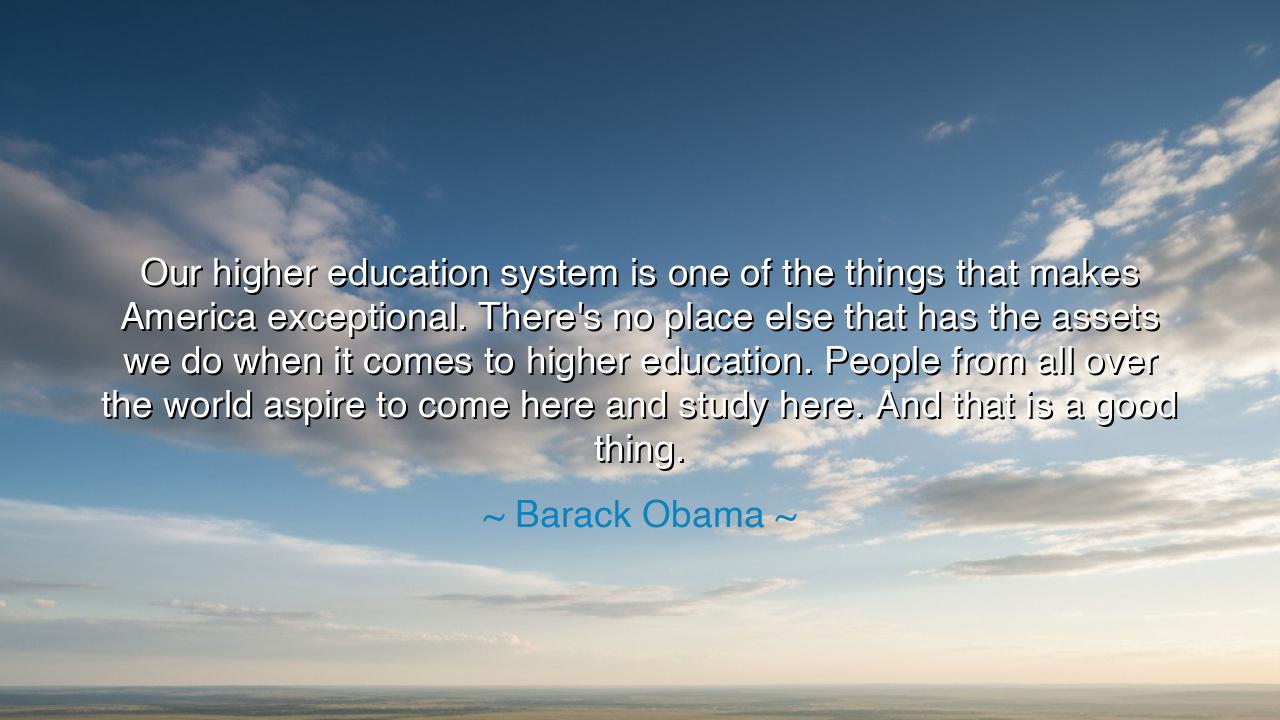
Our higher education system is one of the things that makes
Our higher education system is one of the things that makes America exceptional. There's no place else that has the assets we do when it comes to higher education. People from all over the world aspire to come here and study here. And that is a good thing.






In the noble words of Barack Obama, “Our higher education system is one of the things that makes America exceptional. There's no place else that has the assets we do when it comes to higher education. People from all over the world aspire to come here and study here. And that is a good thing.” These words ring not only as a tribute to a nation’s achievement, but as a testament to the power of knowledge, opportunity, and vision. For in them lies a truth that transcends borders: that education, when pursued with purpose and shared with generosity, becomes the foundation upon which civilizations rise and endure.
Obama spoke these words as a statesman reflecting upon the soul of his country — but beneath them runs a truth older than nations: that a society that honors learning is a society that honors its own future. He spoke of higher education, not merely as the walls of universities or the gathering of credentials, but as the living temple of ideas — a place where curiosity is sacred, where discovery is worship, and where the youth of every nation come to shape not only their minds, but their destinies. In his words, America becomes not a land of conquest, but a land of enlightenment — a beacon that draws seekers from every shore.
To understand the origin of this vision, one must remember that the founding of the American university was itself an act of faith — a belief that liberty could not endure without learning, and that democracy demanded not only freedom of voice but freedom of thought. From the early days of Harvard and Yale to the vast networks of modern research institutions, education in America grew from humble roots to global renown. These universities became crucibles of invention and imagination — where Edison’s light found its spark, where the secrets of the atom were revealed, and where the digital age was born from circuits of human genius. Thus, Obama’s words are both celebration and reminder — that this legacy, this light, must be tended with care.
But the greatness of America’s education system does not lie in its buildings or its wealth alone. It lies in its diversity — in the gathering of minds from every land and language, united by the common pursuit of understanding. Consider the story of Albert Einstein, who fled persecution in Europe and found refuge and purpose in the halls of Princeton. There, amid freedom and curiosity, his genius flourished, and his theories reshaped the universe itself. Or think of Malala Yousafzai, who, though not born in America, came to its universities to expand her voice for global education. In her, and in countless others, Obama’s words find their living proof: that people from all corners of the world look to this land not only for prosperity, but for enlightenment.
Yet his statement carries within it both pride and responsibility. For every privilege is also a trust. The exceptionalism Obama speaks of is not one of superiority, but of stewardship. To have great educational assets is to bear the duty of using them wisely — to ensure that access to learning is not hoarded by the few, but opened to the many. The strength of a nation is not measured by the grandeur of its universities, but by the character of the citizens they produce. Knowledge that serves only ambition is barren; knowledge that serves humanity is divine.
Throughout history, nations that cherished learning have flourished — and those that neglected it have crumbled into the dust of time. The libraries of Alexandria once shone as the heart of the ancient world, drawing scholars from afar, much as American universities do today. But when that flame was extinguished, so too was an age of light. Let that memory guide us: education must be guarded not as luxury, but as the lifeblood of civilization. Obama’s words, then, are a modern echo of an eternal command — to nourish the mind as we do the body, for the fate of a people rests upon the wisdom of its youth.
The lesson, dear listener, is this: treasure education, wherever you find it, and honor it by using it for good. Learn not only to advance yourself, but to uplift others. Seek knowledge, not for vanity, but for virtue. If you study, let your studies serve truth; if you teach, let your teaching serve hope. And if you lead, let wisdom, not pride, be your compass. For in this, you will embody the spirit of what Obama praised — a spirit not confined to America alone, but belonging to all humanity: the belief that through learning, we rise beyond our origins, and through understanding, we become truly free.
And so, let these words stand as both praise and call to action. For as Barack Obama declared, it is indeed a “good thing” that people from every corner of the earth come to seek knowledge in the halls of learning. But the greater good lies in what they carry back — the light of education, spreading like dawn across the world. Let that light never dim. Let us, each in our way, keep the lamp of learning burning — for where there is education, there is hope; and where there is hope, there is the enduring promise of humanity itself.






AAdministratorAdministrator
Welcome, honored guests. Please leave a comment, we will respond soon